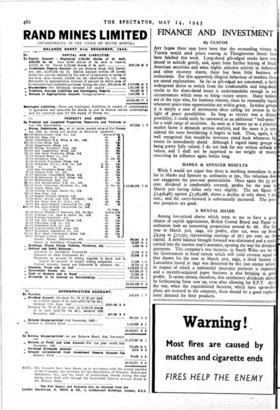FINANCE AND INVESTMENT
By CUSTOS
ANY hopes there may have been that the resounding victory in Tunisia would send prices soaring in Throgmorton Street have been falsified this week. Long-dated gilt-edged stocks have con- tinued to subside gently, and, apart from further buying of South American securities and some highly selective activity in industrial and other recovery shares, there has been little business of enthusiasm. For this apparently illogical behaviour of markets there are sound explanations. So far as gilt-edged are concerned, a fairly widespread desire to switch from the irredeemable and long-dated stocks to the short-dated issues is understandable enough in any circumstances which seem to bring victory nearer. Many holders are of the type who, for business reasons, must be reasonably liquid whenever peace-time opportunities arc within grasp. In ether groups it is simply a case of investment ideas calling for review in the light of peace possibilities. So long as victory was a distant possibility, it could easily be canvassed as an additional " bull-point" for a wide range of securities. As soon as it looms up as a practical market factor it demands serious analysis, and the more it is con- sidered the more bewildering it begins to look. Then, again, it is well recognised that would-be investors stand back whenever b' events lie immediately ahead. Although I regard many groups as being pretty fully valued, I do not look for any serious setback in values, and I shall not be surprised to see weight of money exercising its influence again before long.
MARKS & SPENCER RESULTS
While I would not argue that there is anything immediate to go for in Marks and Spencer 5s. ordinaries at 5os., this valuation does not exaggerate the post-war potentialities. Once again the 35 per cent. dividend is comfortably covered, profits for the year to March 31st having fallen only very slightly. The net figure of £1,456,467, against £1,583,088, shows a decline of only about 7 per cent., and the carry-forward is substantially increased. The post- war prospects are good.
A RENTAL SHARE Among low-priced shares which seem to me to have a good chance of capital appreciation, British Coated Board and Paper 55 ordinaries look an interesting proposition around 6s. 6d. For the year to March 31st, 1942, net profits, after tax, were up from £9,504 to £17,225, representing earnings of 28.7 per cent, on the capital. A debit balance brought forward was eliminated and a credit carried into the current year's accounts, opening the way for dividend payments. This company's two factories in South Wales are let to the Government at fixed' rentals which will yield revenue equal to that shown for the year to March 31st, 1942, a third factory in Lancashire leased in 1941 was destroyed by fire (not enemy action) in respect of which a substantial insurance payment is expected, and a recently-acquired paper business is also bringing in good profits. It seems certain, therefore, that satisfactory dividends should be forthcoming from now on, even after allowing for E.P.T. After the war, when the requisitioned factories, which have up-to-date plant, are restored to the company, there should be a good replace- ment demand for their products.


























 Previous page
Previous page